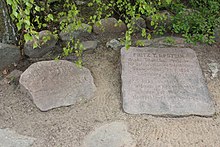Fritz T. Epstein
Fritz Theodor Epstein (* 20th August 1898 in Sarreguemines , Alsace-Lorraine , † 6. December 1979 in Lüneburg ) was a German - American historian for Eastern European history . Of German-Jewish descent, he emigrated in 1933 with his wife Herta geb. Bertelsmann and the two children via London to the USA. Epstein returned to Germany in old age and married a second time after the death of his wife.
Life
Epstein was the son of mathematician Paul Epstein . Through his mother, née Wiesengrund , he was related to Theodor Adorno . His son Klaus Werner Epstein also became a historian.
Epstein's studies at the Ruprecht-Karls-Universität Heidelberg were interrupted by the First World War. After the war he resumed his studies and received his doctorate in Berlin in 1924 on the tsarist administration of Russia in the 15th to 17th centuries. Epstein worked on his habilitation thesis on the relations between the Soviet Union and the Western powers 1917-1920 and their intervention in the Russian Civil War at the University of Hamburg with Richard Salomon (1926-1931) and at the University of Frankfurt am Main (1932-1933). A habilitation and university career was blocked in 1933 when the NSDAP came to power . With the support of the Academic Assistance Council (AAC), he and his family emigrated to London in 1933 and then to the USA in 1936. He taught at Harvard University (1937–1943) and worked for the US State Department during the war . From 1948 to 1951 Epstein was curator of the Central European and Slavic Collections of the Hoover Library at Stanford University , 1951–1960 USSR & Central European Specialist of the Library of Congress , since 1962 professor on the faculty of Indiana University Bloomington and curator of the Slavic Collection there .

After the war he was often researching and teaching in Germany, including as editor of the documents on German foreign policy 1918–1945 and as a visiting professor at the Universities of Bonn, Freiburg and Hamburg.
After his retirement in 1969, Epstein returned to Germany. Epstein had a lifelong friendship with Erna Christine Kresina, later wife of the painter Erwin Vollmer . Their correspondence was only interrupted by the war. After they were both widowed, they married in old age.
Fonts (selection)
- Staden, Heinrich von, Notes on the Moscow State. Edited from the manuscript of the Prussian State Archives in Hanover. by Fritz T. Epstein. 2nd, extended edition Hamburg, Cram, De Gruyter, 1964.
- The American bibliography of Russian and east European studies for 1966 (Russian and East European series)
- Germany and the East - Bloomington: Indiana University Press, 1973
literature
- Werner Röder; Herbert A. Strauss (Ed.): International Biographical Dictionary of Central European Emigrés 1933-1945 , Vol II, 1 Munich: Saur 1983 ISBN 3-598-10089-2 , pp. 267f.
- Epstein, Fritz Theodor. In: Lexicon of German-Jewish Authors . Volume 6: Dore – Fein. Edited by the Bibliographia Judaica archive. Saur, Munich 1998, ISBN 3-598-22686-1 , pp. 402-404.
- Obituaries (selection)
- Günter Moltmann, Klaus Schwabe, in: Amerikastudien / American Studies, vol. 25, issue 1, 1980.
- Wolfgang Geierhos, in: Deutsche Studien, Vol. 18, 1980.
- Werner Philipp, in: Yearbooks for the History of Eastern Europe, Vol. 28, Issue 1.
- Alexander Fischer, in: Frankfurter Allgemeine Zeitung, December 11, 1979.
Awards
- Honorary professorships at the Universities of Bonn (1961) and Freiburg (1974)
- Appointment as professor emeritus at the Johann Wolfgang Goethe University, Frankfurt am Main
- 1969/70 election as chairman of the Conference Group for Central European History of the American Historical Association
- Federal Cross of Merit, 1st Class (April 25, 1959)
- 1968 Dr. hc from the University of Hamburg
- Fritz T. Epstein appropriated to the completion of the 65th year of life (Yearbooks for the history of Eastern Europe. New series. Vol. 11th year 1963. Issue 3.)
- Russia-Germany-America. Festschrift for Fritz T. Epstein on his 80th birthday. ed. by Alexander Fischer, Günter Moltmann and Klaus Schwabe. (Frankfurt historical treatises), Wiesbaden: Steiner, 1978.
- The Association of Eastern European Historians eV (VOH) awards the Fritz Theodor Epstein Prize every two years .
Individual evidence
- ^ Günter Moltmann, Klaus Schwabe in: Amerikastudien / American Studies , 25th year 1980, issue 1.
- ↑ Information from the Federal President's Office
| personal data | |
|---|---|
| SURNAME | Epstein, Fritz T. |
| ALTERNATIVE NAMES | Epstein, Fritz Theodor |
| BRIEF DESCRIPTION | German-American historian |
| DATE OF BIRTH | August 20, 1898 |
| PLACE OF BIRTH | Sarreguemines |
| DATE OF DEATH | 6th December 1979 |
| Place of death | Luneburg |